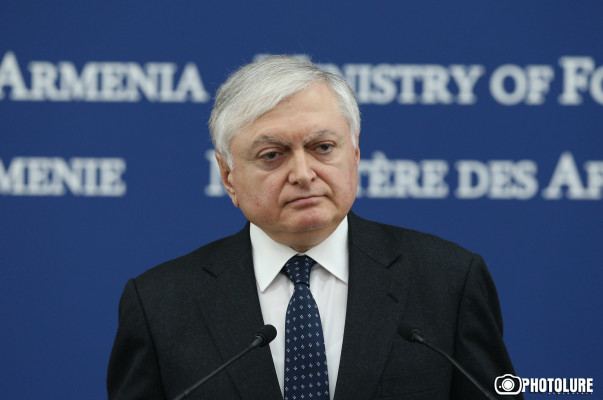Last year posed major challenges to Armenia, causing the country to revise its approaches to the Nagorno-Karabakh conflict and restrain the Azerbaijani aggression, Foreign Minister Edward Nalbandian said today, summing up the developments of 2016.
“We confronted the Azerbaijani aggression, and the situation we had to face in the aftermath of all that. We undertook major steps towards stopping Azerbaijan from adventures; in collaboration with the three co-chairs [of the OSCE Minsk Group], we attempted to awaken the sense of reality in that country,” he told reporters at his annual news conference.
Elaborating on the foreign policy agenda, the minister said they are committed to continue the campaign towards the international condemnation of Genocide. Nalbandian also highlighted Armenia’s presidency of the Collective Security Treaty Organization, and the decision to conduct the Organization of La Francophonie’s next summit in the country. He said they also worked towards the further deepening of the Armenian-Russian strategic alliance and the development of the US-Armenia relations.
Asked to comment on the implementation of the agreements concluded after the April blitzkrieg, Nalbandian said, “Azerbaijan is doing everything possible in an attempt to hamper Armenia and the three co-chairs in their efforts towards resolving the Nagorno-Karabakh conflict through exclusively peaceful methods. Azerbaijan questioned the agreements reached and misrepresented them to an extent that caused the co-chairs to treat them as but a perversion. The co-chairs had to repeat, over and over again, that the ceasefire regime must be unconditionally respected and the agreements reached must be urgently implemented. This is the basic trend that serves as a guideline for Armenia and the three co-chairs. They are aimed at promoting progress in the settlement of the Nagorno-Karabakh conflict,” he added.
As regards Azerbaijani commandos’ attempted incursion into the Armenian territory last December, Mr Nalbandian recalled the Armenian foreign office’s relevant statement, saying:
“Some ask who issued the order: was it issued by the Azerbaijani authorities or by the local command or was it a spontaneous act by the insane commandos? All the options are very bad. For example, if the order was issued by the Azerbaijani leadership, it is beyond comments though I think no one has doubts that Baku is capable of issuing such orders. Or, for example, it was the local command that issued the order. It is evidence that some in their army do not even care about their leadership and can take actions that can escalate the situation. Or insane commandos could have done that. As we hear the Azerbaijani leaders’ ‘Goebbels-like’ rhetoric, such phenomena may occur in Azerbaijan. Otherwise, how is it that a poll showed that 92% of Azerbaijan’s society is for a military settlement of the conflict?”
Mr Nalbandian stressed that it is high time for the international community, primarily for the OSCE Minsk Group co-chairs to sober up Azerbaijan, which is acting in defiance of their demands and calls and is out of touch with reality.












